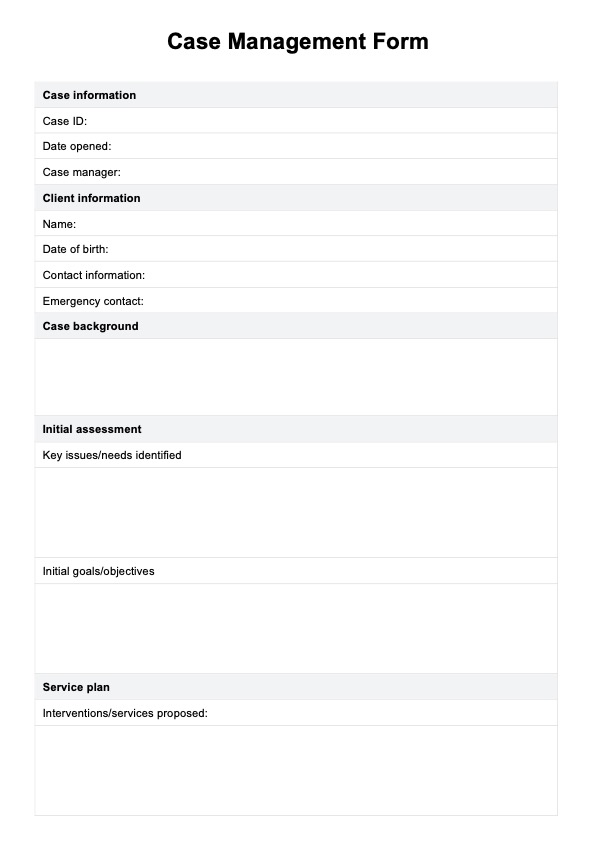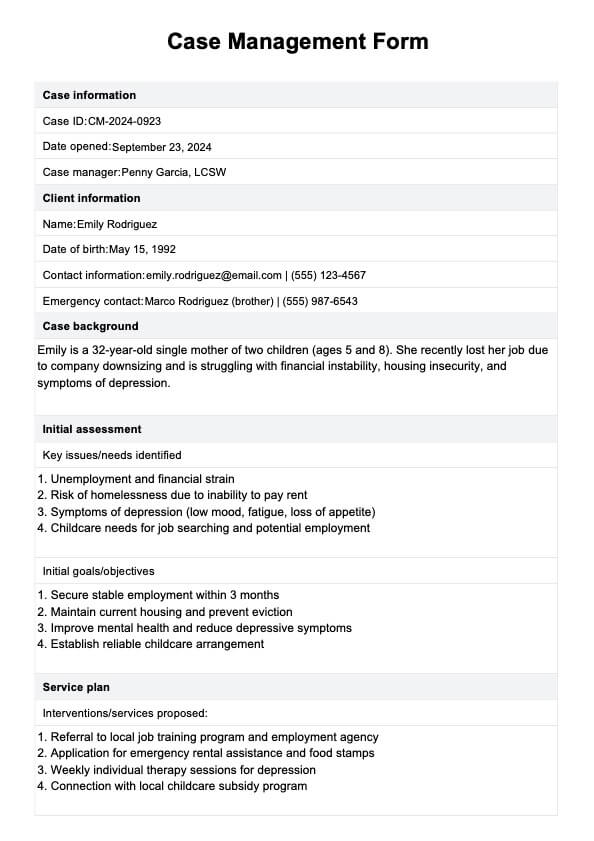-p-500.jpg)
Streamline your professional case handling with our versatile Case Management Form Template, which is ideal for efficient and organized case management.
-p-500.jpg)
By Telita Montales on Jul 15, 2024.
Fact Checked by RJ Gumban.


A Case Management Form Template is a comprehensive tool designed for professionals across various sectors—legal, healthcare, social services, and beyond—to manage and monitor individual cases' complexities effectively. This template is a pivotal resource in systematically organizing and recording vital information throughout the lifecycle of a case. It typically encompasses detailed sections for capturing client or case specifics, including demographic data, case history, and contact information.
Further, it includes areas for thorough initial assessment, capturing the client's needs, challenges, and objectives. A service plan section follows this, outlining proposed interventions or services tailored to address the identified needs. The template also features a dynamic component for progress tracking, allowing case managers to note developments, modifications in the client's situation, and necessary adjustments to the service plan.
The final sections of the template are dedicated to documenting the outcomes of the case management process, including the achievement of set goals, the resolution of the case, and any follow-up actions or plans. This meticulous documentation ensures that all critical data is efficiently recorded, aiding case managers in making informed decisions, effectively planning interventions, and evaluating the outcomes of their efforts.
PDF Template Example PDF

Steps involved in using our Printable Case Management Form Template:
Record essential details about the client or case, such as the name, contact information, and case number. This section forms the foundation of the case record.
Here, document an in-depth evaluation of the client’s needs, challenges, and goals. This section is crucial for understanding the client's situation and planning appropriate interventions.
Develop and outline a comprehensive service plan based on the initial assessment. This plan should detail the proposed services or interventions addressing the client’s needs.
Regularly update the form with notes on the client's progress, any significant changes in their circumstances, and adjustments to the service plan. This ongoing tracking is vital for monitoring the effectiveness of the interventions.
Record the case management process outcomes and any subsequent follow-up actions or ongoing support plans.
The Case Management Form Template is an indispensable tool deployed in various professional settings to streamline the management and tracking of cases. Its versatility makes it suitable for a wide range of applications, each tailored to the specific needs of different fields.
In each scenario, the Case Management Form Template ensures detailed tracking, regular updates, and efficient management of individual cases, contributing to better organizational efficiency, client satisfaction, and successful case resolutions.
The results gleaned from our Free Case Management Form indicate the efficacy and impact of the case management process. Positive results testify to successful case resolutions, indicating that the strategies and interventions implemented were effective. This includes achieving set goals, client progress, satisfaction, and the managers' efficient case handling. Such outcomes often correlate with enhanced service delivery, improved client well-being, and fulfillment of organizational objectives.
Conversely, negative results signal areas that require attention or adjustments. These might include unresolved client issues, unmet goals, or inefficiencies in the management process. Such findings are crucial as they provide an opportunity for reflection, learning, and improvement in the case management approach.
The utilization of Case Management Forms is deeply rooted in evidence-based practices across various professional disciplines. The framework for these forms has evolved through ongoing research and implementation, demonstrating their significant impact on the management and resolution of cases.
In the healthcare sector, systematic case management using structured forms has improved patient outcomes substantially. A study by Smith, B. D., & Smith, S. (2017) in the Journal of Clinical Nursing found that organized case documentation contributes to better patient care planning and monitoring, ultimately leading to enhanced patient recovery rates. This aligns with social work and legal practice findings where structured forms facilitate comprehensive client support and efficient case resolution.
Furthermore, business and customer service management research indicates that structured case management forms enhance service delivery and customer satisfaction. According to Johnson, M., & Clark, D. (2018), as published in the Journal of Business Research, organizations that adopt systematic case management approaches report higher client retention and satisfaction rates.
These forms have also been instrumental in educational and non-profit organizations, aiding program management and student services. A study by Williams, A., & Thompson, C. (2019) in the Journal of Education and Social Work highlighted the role of structured case management in improving student support services, leading to better student engagement and success.
The research supporting Case Management Forms across various sectors underlines their importance in achieving effective and efficient case resolutions, client satisfaction, and organizational success.
Johnson, M., & Clark, D. (2018). The role of case management forms in enhancing customer service delivery. Journal of Business Research, 88, 125-133.
Smith, B. D., & Smith, S. (2017). The impact of case management forms on patient outcomes in healthcare settings. Journal of Clinical Nursing, 26(13-14), 2045-2056.
Williams, A., & Thompson, C. (2019). Structured case management in educational settings: A tool for student success. Journal of Education and Social Work, 53(2), 234-247.